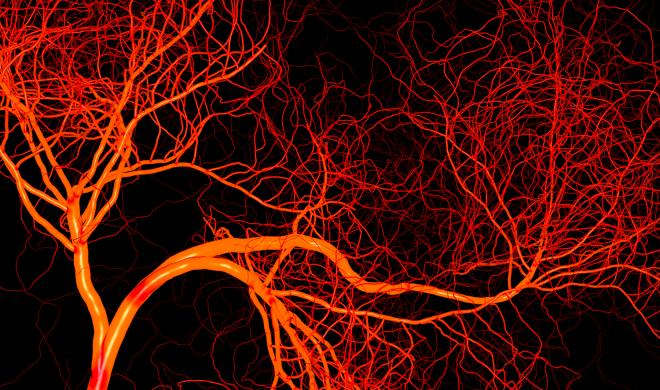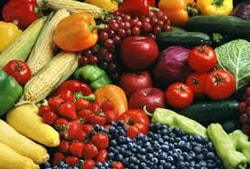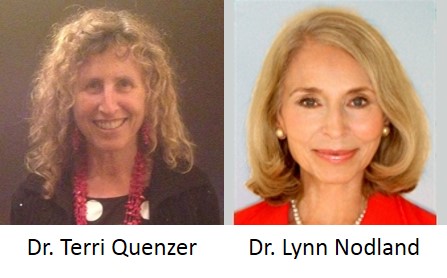Blood vessels are a key component of our circulatory system, and angiogenesis is the natural process in our bodies that grows blood vessels. Angiogenesis is a defense system in our bodies that needs to be balanced.
When angiogenesis is balanced, we have the right number of blood vessels. That keeps everything else is in balance, including other systems that are connected to the blood supply such as our heart, lungs, brain, and nerves, as well as the functioning of all our organs.
When there’s too little angiogenesis, you don’t have enough blood vessels, which causes ischemia, a restriction in the blood supply to tissues. Ischemia is associated with coronary heart disease, and results in a shortage of oxygen and glucose needed to keep tissue alive.
With cancer, excessive angiogenesis is an imbalance that results in the growth of way too many blood vessels as the cancer cells establish their own blood supply, which feeds the disease.
William Li and his colleagues discovered many inhibitors and mediators of angiogenesis in foods! These foods contain bioactives, which are antioxidants and help keep the angiogenesis balance in check.
Can we use food to treat cancer by inhibiting angiogenesis? YES! That’s the focus of Li’s research. According to Li: Foods are the chemotherapy that we take three times a day!
Angiogenesis-inhibiting foods prevent cancer cells from establishing their own blood supply, which helps us with cancer prevention and intervention. Many bioactives are very powerful mediators of healthy angiogenesis.
What kinds of foods are we talking about? Nutrient- and antioxidant-rich whole plant-based foods!
When angiogenesis is balanced, we have the right number of blood vessels. That keeps everything else is in balance, including other systems that are connected to the blood supply such as our heart, lungs, brain, and nerves, as well as the functioning of all our organs.
When there’s too little angiogenesis, you don’t have enough blood vessels, which causes ischemia, a restriction in the blood supply to tissues. Ischemia is associated with coronary heart disease, and results in a shortage of oxygen and glucose needed to keep tissue alive.
With cancer, excessive angiogenesis is an imbalance that results in the growth of way too many blood vessels as the cancer cells establish their own blood supply, which feeds the disease.
William Li and his colleagues discovered many inhibitors and mediators of angiogenesis in foods! These foods contain bioactives, which are antioxidants and help keep the angiogenesis balance in check.
Can we use food to treat cancer by inhibiting angiogenesis? YES! That’s the focus of Li’s research. According to Li: Foods are the chemotherapy that we take three times a day!
Angiogenesis-inhibiting foods prevent cancer cells from establishing their own blood supply, which helps us with cancer prevention and intervention. Many bioactives are very powerful mediators of healthy angiogenesis.
What kinds of foods are we talking about? Nutrient- and antioxidant-rich whole plant-based foods!
Some common antioxidants include (and are not limited to):
- Beta-carotene. A precursor to vitamin A and found in orange vegetables and fruits such as carrots, yams, butternut squash, mango, and cantaloupe.
- Lycopene. A cousin to beta-carotene and found in red vegetables and fruits such as tomatoes, watermelon, and pink grapefruit.
- Vitamin C. Found in vegetables and fruits such as leafy green vegetables, peppers, tomatoes, citrus fruits, kiwi fruit, and papaya.
- Vitamin E. Found in beans, including soy beans, pinto beans, and chickpeas, as well as seeds and nuts.
- Selenium. A mineral found in foods such as mushrooms, onions, whole grains, soy beans, seeds, and some nuts.
- Manganese. A mineral found in almost all whole plant-based foods.
- Iron. A mineral found in beans and leafy green veggies, seaweed, coriander, peppers, mushrooms, cabbage, squash and other root vegetables, and most whole grains, nuts, seeds, and even fruits. Iron is absorbed from foods best when combined with vitamin C-rich foods (see above).
- Copper. A mineral found in beans, potatoes, mushrooms, radishes, leeks, chile peppers, seaweed, and most whole grains.
Beta-carotene and lycopene are assisted by selenium and reside in our cell membranes, acting to shield the cell membranes from damage by free radicals. Vitamin C stays in the fluid between cells, patrolling for and neutralizing free radicals before they can get to the cells. I like to think of antioxidants as the “A-C-E” (Get it? Vitamins A, C, & E) up my sleeves for fighting free radicals.
While we cannot completely eliminate free radicals from our bodies, we can control the balance of antioxidants and free radicals by consuming lots of brightly colored produce (fruits and vegetables) as well as beans and whole grains.
To learn more about free radicals and antioxidants, click here. And to learn about how antioxidants are measured, click here.
Reference
William W. Li, Vincent W. Li, Michelle Hutnik, and Albert S. Chiou, Tumor Angiogenesis as a Target for Dietary Cancer Prevention, Journal of Oncology Volume 2012, Article ID 879623, 23 pages.





 RSS Feed
RSS Feed